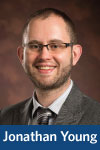Welcome to the first installment of the 2016 Member Appreciation Month featured member interviews! These interviews are a part of an ongoing monthly series which seeks to introduce our readers to members who are making a difference in their communities. For the month of May, we’ll be posting a new interview once a week. Today, we feature Jonathan Young, senior IRB consultant at Rush University Medical Center.
PRIM&R: When and why did you join the field?
Jonathan Young (JY): I started working with the institutional review board (IRB) in July of 2010 as a graduate student in political science. I was familiar with the IRB, having done research prior to that and thought the policy application aspect of human research protections was interesting.
PRIM&R: What is one tool you use every day that you could not do your job without?
JY: We have an electronic IRB submission system that I definitely could not do without on a day-to-day basis, without sacrificing productivity.
PRIM&R: What is one thing you wish the general public knew about human subjects research?
JY: I wish people knew that we are not out to get them. There seems to be a pervasive sense that the IRB is a hindrance to research when that’s not the case. I see our role as a collaborator, not only helping protect subjects, but also helping to maintain scientific validity.
PRIM&R: What is something you know now that you wish someone had told you when you first entered this field? Or, what is an example(s) of a lesson you had to learn the hard way?
JY: When I started working with the IRB, I had no idea how often I would need to communicate with the researchers. My perception prior to that was one of a detached IRB giving a judgment, but in actuality there is constant communication back and forth between investigators and the IRB staff. I consider this one of the best things about the job.
PRIM&R: What changes in the research field most concern you? What changes are you encouraged by?
JY: I’m both concerned and encouraged by the notice of proposed rulemaking for the Common Rule. There are some good changes (e.g., changes in the renewal process), but also ones that I see as bad or misguided (e.g., specimens and consent for biorepositories).
PRIM&R: What motivates you to maintain your commitment to advancing ethical research?
JY: My upbringing definitely factors into my commitment to advancing ethical research. I was mostly raised by my grandmother and I adopted many of her moral leanings. I also constantly think about the history behind research ethics for motivation and to gain perspective when needed.
PRIM&R: Have there been any PRIM&R events or talks that you have attended that have made a significant impact on your approach to your work? If so, what were they and how did they influence you?
JY: At PRIM&R’s 2014 AER Conference, I was very inspired by the keynote address by Anthony Fauci MD, entitled “Addressing the HIV/AIDS Pandemic: Ethical Challenges.” The presentation sparked further interest in the international research ethics field and also brought home how our work impacts others.
[Editor’s note: Dr. Fauci’s keynote address is available free to PRIM&R members on our Knowledge Center; non-members can purchase the proceedings from this meeting to access the session and other materials from those events here .]
PRIM&R: How has membership in PRIM&R’s community of research ethics professionals helped you to advance in your career or do your job better?
JY: Being a PRIM&R member has definitely helped advance my knowledge in the field. I’m constantly attending the webinars that are offered, along with my colleagues who work with me. I also find the conferences very helpful, both for increasing knowledge and for networking with people who deal with the same issues I do on a day-to-day basis.
Thank you, Jonathan, for your ongoing contributions to the field! We’re thrilled to have you as a member of our community.
To learn more about Member Appreciation Month, visit our website.


No comments! Be the first commenter?